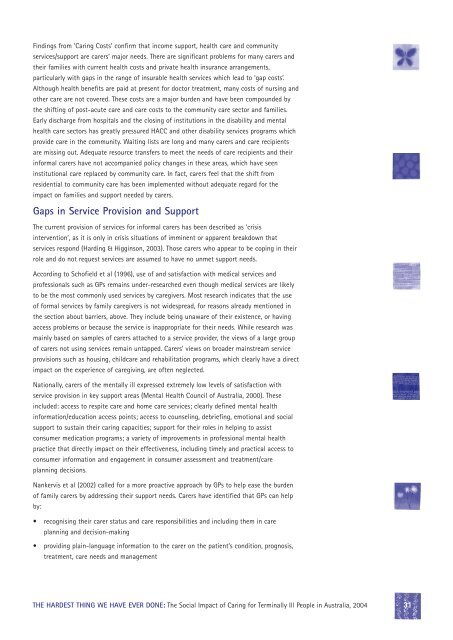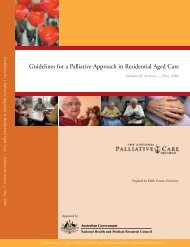The hardest thing we have ever done - Palliative Care Australia
The hardest thing we have ever done - Palliative Care Australia
The hardest thing we have ever done - Palliative Care Australia
Create successful ePaper yourself
Turn your PDF publications into a flip-book with our unique Google optimized e-Paper software.
Findings from ‘Caring Costs’ confirm that income support, health care and community<br />
services/support are carers’ major needs. <strong>The</strong>re are significant problems for many carers and<br />
their families with current health costs and private health insurance arrangements,<br />
particularly with gaps in the range of insurable health services which lead to ‘gap costs’.<br />
Although health benefits are paid at present for doctor treatment, many costs of nursing and<br />
other care are not covered. <strong>The</strong>se costs are a major burden and <strong>have</strong> been compounded by<br />
the shifting of post-acute care and care costs to the community care sector and families.<br />
Early discharge from hospitals and the closing of institutions in the disability and mental<br />
health care sectors has greatly pressured HACC and other disability services programs which<br />
provide care in the community. Waiting lists are long and many carers and care recipients<br />
are missing out. Adequate resource transfers to meet the needs of care recipients and their<br />
informal carers <strong>have</strong> not accompanied policy changes in these areas, which <strong>have</strong> seen<br />
institutional care replaced by community care. In fact, carers feel that the shift from<br />
residential to community care has been implemented without adequate regard for the<br />
impact on families and support needed by carers.<br />
Gaps in Service Provision and Support<br />
<strong>The</strong> current provision of services for informal carers has been described as ‘crisis<br />
intervention’, as it is only in crisis situations of imminent or apparent breakdown that<br />
services respond (Harding & Higginson, 2003). Those carers who appear to be coping in their<br />
role and do not request services are assumed to <strong>have</strong> no unmet support needs.<br />
According to Schofield et al (1996), use of and satisfaction with medical services and<br />
professionals such as GPs remains under-researched even though medical services are likely<br />
to be the most commonly used services by caregivers. Most research indicates that the use<br />
of formal services by family caregivers is not widespread, for reasons already mentioned in<br />
the section about barriers, above. <strong>The</strong>y include being unaware of their existence, or having<br />
access problems or because the service is inappropriate for their needs. While research was<br />
mainly based on samples of carers attached to a service provider, the views of a large group<br />
of carers not using services remain untapped. <strong>Care</strong>rs’ views on broader mainstream service<br />
provisions such as housing, childcare and rehabilitation programs, which clearly <strong>have</strong> a direct<br />
impact on the experience of caregiving, are often neglected.<br />
Nationally, carers of the mentally ill expressed extremely low levels of satisfaction with<br />
service provision in key support areas (Mental Health Council of <strong>Australia</strong>, 2000). <strong>The</strong>se<br />
included: access to respite care and home care services; clearly defined mental health<br />
information/education access points; access to counseling, debriefing, emotional and social<br />
support to sustain their caring capacities; support for their roles in helping to assist<br />
consumer medication programs; a variety of improvements in professional mental health<br />
practice that directly impact on their effectiveness, including timely and practical access to<br />
consumer information and engagement in consumer assessment and treatment/care<br />
planning decisions.<br />
Nankervis et al (2002) called for a more proactive approach by GPs to help ease the burden<br />
of family carers by addressing their support needs. <strong>Care</strong>rs <strong>have</strong> identified that GPs can help<br />
by:<br />
• recognising their carer status and care responsibilities and including them in care<br />
planning and decision-making<br />
• providing plain-language information to the carer on the patient’s condition, prognosis,<br />
treatment, care needs and management<br />
THE HARDEST THING WE HAVE EVER DONE: <strong>The</strong> Social Impact of Caring for Terminally Ill People in <strong>Australia</strong>, 2004<br />
31
















